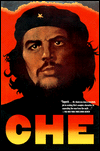The Guerrilla, the Entrepreneur and the Motivation to Change the World
 Alphachimp
Alphachimp  Friday, January 14, 2005 at 12:24AM
Friday, January 14, 2005 at 12:24AM  Reading two or more good books at a time can be like holding two mirrors up to each other; the ideas reflect the other and creates a tunnel through time and space. The effects can be trippy.
Reading two or more good books at a time can be like holding two mirrors up to each other; the ideas reflect the other and creates a tunnel through time and space. The effects can be trippy.
Two of the three books I'm reading sketch out mirror figures of the passionate revolutionary: the guerilla and the social entrepreneur.The Social Entrepreneur
A detailed look at the motivations and trials of Ashoka Fellows is chronicled in How to Change the World: Social Entrepreneurs and the Power of New Ideas by David Bornstein.
 These passionate social entrepreneurs have been tapped by the organization to transfer a social mission into a social enterprise. The Fellowship provides the time and resources for Fellows to quit their jobs and concentrate energy on hammering out the business processes, fundraising, generating community participation and driving political will to ensure measurable change.
These passionate social entrepreneurs have been tapped by the organization to transfer a social mission into a social enterprise. The Fellowship provides the time and resources for Fellows to quit their jobs and concentrate energy on hammering out the business processes, fundraising, generating community participation and driving political will to ensure measurable change. Bill Drayton, former head of the EPA and McKinsey consultant, defines the four qualities of the social entrepreneur as:
Bill Drayton, former head of the EPA and McKinsey consultant, defines the four qualities of the social entrepreneur as:
Bornstein's blog has a detailed story tracing the evolution of one man's motivation to become a social entrepreneur.
The Guerrilla
Oddly enough, investigative journalist, Jon Lee Anderson has asked the same questions about self-proclaimed freedom fighter as Bornstein has asked regarding entrepreneurs. Namely, why do guerilla fighters endure the hardship, degradation, danger, tedium and isolation of live on the run? Why do they risk everything to fight for an ideal; one which they may never see take hold in the their lifetimes?
Anderson's earlier work, Guerrillas: Journeys in the Insurgent World, originally published in 1992, has been re-released with a new foreword, in which the author emphasizes the dangers of assuming we understand "the insurgents" we face in Iraq.
As a storyteller his writing is consistently rich and humane. As a journalist , he adroitly crafts a probing analysis of the motivational factors driving young men and woman to join insurgent factions in areas as diverse as El Salvador, Western Sahara, Palestine and Burma.
"Guerillas are people living in defiance of their would-be conquerors, according to their own laws and beliefs, telling their own stories and legends--making history," writes Anderson in the new foreword.
His book looks across the motivations of the different groups, with the author involving us in the texture and patterns of life inside the parallel reality of each movement. Anderson examines the hardships of making war while making a living, retelling each group's unique "myths of creation" that give meaning and justification to the resistance. He finds that each faction evolves its own system of justice and rules for joining The Family; death, in most cases, seems to be the only way out.
A writer who has survived battle zones in El Salvador, Afghanistan and many parts of Africa and Asia, Jon Lee Anderson remained in Iraq during the American invasion and published a first-hand account in The Fall of Baghdad.
His book on Cuban revolutionary, Che Guevara: A Revolutionary Life (1997) is the book that established Anderson's reputation as one of the great foreign correspondents of his time. On Global Guerrillas
For a constantly updated blog on the topic, look to John Robb. He has lived, worked, and traveled extensively in Central/South America, Africa, Asia, and Europe. Robb served at the Department of Defense Counter-terrorism in a tier one counter-terrorist unit that worked closely with Delta and Seal Team 6; he was a top technology analyst covering Internet technologies at Forrester Research; and, he built a company and grew it from $0 to over $23 m a year in revenue and 135 people. This gives him a unique view of the motivations behind both the guerilla and the startup entrepreneur.
PHOTO: Infantry securing main gun hole, An Najaf, 14-AUG-2004, John Baker
Robb examines the influence of connectivity on the effectiveness of small distributed networks to inflict maximum damage on big systems (like the US military). In global guerrilla warfare (a combination of open source innovation, bazaar transactions, and low tech weapons), the point of greatest emphasis is called a systempunkt. It is the point in a system (either an infrastructure or a market), always identified by autonomous groups within the bazaar, where a swarm of small insults will cause a cascade of collapse in the targeted system.
www.globalguerrillas.typepad.com/globalguerrillas/






Reader Comments